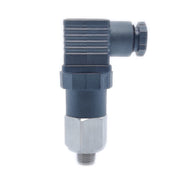Introduction
Piezoelectric sensors have become a popular choice for various applications due to their versatility, high sensitivity, and reliability. However, with a multitude of options available, choosing the right sensor for your specific needs can be challenging. XIDIBEI, a leading manufacturer of cutting-edge piezoelectric sensors, offers a diverse range of products designed to cater to various industries and applications. In this buyer's guide, we will outline key considerations to help you select the perfect piezoelectric sensor from XIDIBEI's extensive product lineup.
Understanding Your Application Requirements
Before diving into the world of piezoelectric sensors, it's essential to have a clear understanding of your application requirements. Consider the following factors:
-
Sensing Parameters: Identify the specific parameters you need to measure, such as pressure, vibration, or acceleration.
-
Operating Environment: Evaluate the environmental conditions in which the sensor will operate, including temperature, humidity, and potential exposure to chemicals or contaminants.
-
Size and Weight Constraints: Determine if your application has any size or weight limitations that the sensor must accommodate.
-
Performance Requirements: Assess the desired sensitivity, frequency range, and accuracy of the sensor.
-
Budget: Establish a budget for your sensor investment, taking into account not only the upfront costs but also the long-term maintenance and replacement costs.
Key Features to Consider in XIDIBEI's Piezoelectric Sensors
Once you have a clear understanding of your application requirements, consider the following features in XIDIBEI's piezoelectric sensors:
-
Sensing Material: XIDIBEI offers sensors made from various piezoelectric materials, each with unique properties and advantages. Select the material that best suits your application's requirements for sensitivity, temperature stability, and durability.
-
Sensor Design: XIDIBEI provides sensors in various designs, including single-element, multi-element, and array configurations. Choose a design that aligns with your application's complexity and measurement needs.
-
Temperature Resistance: For applications exposed to temperature fluctuations, XIDIBEI's temperature-resistant sensors are an excellent choice. These sensors are designed to maintain their performance in a wide range of temperatures, ensuring accurate and reliable measurements.
-
Integration and Compatibility: Consider how easily the sensor can be integrated into your existing system. XIDIBEI's sensors are designed for seamless integration with various electronics and data acquisition systems, making them a versatile choice for diverse applications.
-
Customization Options: XIDIBEI offers customization options to meet your unique application requirements, from tailored sensor designs to bespoke calibration services.
Support and Service from XIDIBEI
In addition to providing high-quality piezoelectric sensors, XIDIBEI offers exceptional customer support and service to ensure your complete satisfaction. Their team of experts is available to guide you through the selection process, provide technical assistance, and help you optimize your sensor system.
Conclusion
Selecting the right piezoelectric sensor for your application is crucial to ensuring accurate and reliable measurements. By understanding your application requirements and considering the key features of XIDIBEI's piezoelectric sensors, you can confidently choose the ideal sensor to meet your needs. With XIDIBEI's commitment to quality, innovation, and customer support, you can rest assured that your investment in their piezoelectric sensors will yield exceptional results for your application.



Leave a comment